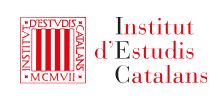The line of research in biospeleology and prospecting of hypogeous fauna is both institutional and historical, as it dates back some time. It was promoted by the eminent entomologist, curator and director of the Museum, Dr. Francesc Español i Coll, a tireless, excellent teacher of young entomologists, and particularly speleologists, many of whom are still today loyal collaborators of the Museum.
This long-standing harvesting project has resulted in a collection far in excess of 100,000 specimens, representing all the members of the hypogeous Arthropod phylum (crustaceans, arachnids, myriapoda, insects and entognatha). The collection of cavernicolous Coleoptera, however, is one of the best in Europe, and contains a considerable number of type specimens. The collection is fundamentally Iberian, but is also sourced from numerous campaigns in Morocco’s Atlas region.
These collection projects are done thanks to the invaluable collaboration of the members of the Catalan Biospeleology Association (BIOSP).
Research projects
-
SPELEOGENOMICS-2
- Year
- 2023
- Supported
- Institut d'Estudis Catalans
SPELEOGENOMICS-2 is a project that proposes to generate reference genomes for six highly specialized cave-dweller species representing all major lineages within arthropods. The focus will be on endemic or mostly circumscribed organisms in the area of influence of CBP (“Catalan Biogenome Project”). Cave-dwellers have converged to remarkably similar phenotypic and metabolic traits due to the strong selective forces exerted by the subterranean environment. Unfortunately, the extreme level of adaptation makes these species vulnerable to environmental changes. Caves are highly fragile habitats under constant threat due to ongoing pollution, land use change, touristic activities, or climate change. The proposed reference genomes will help to explore many scientific questions, such as their phylogenetic position and the genomic adaptations that facilitate their survival in extreme environments, as well as their demographic history and genetic variability, which will significantly aid in ongoing conservation efforts.
-
Barcoding III: Arthropods of the Hypogeum Environment of the Network of Natural Parks of the Diputació de Barcelona
- Year
- 2023
- Supported
- Diputació de Barcelona
- Duration
- 3 years
The primary aim is to ascertain the state of conservation of some of the hypogeous invertebrate species which are currently threatened or protected in Catalonia, as well as the state of conservation of their habitat.

